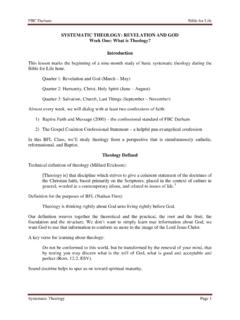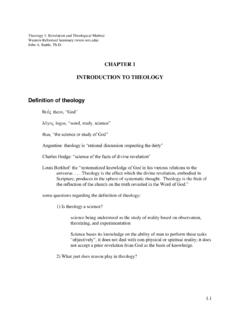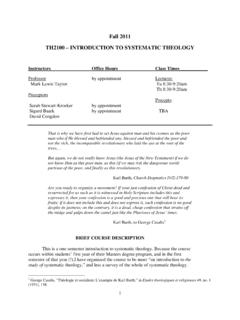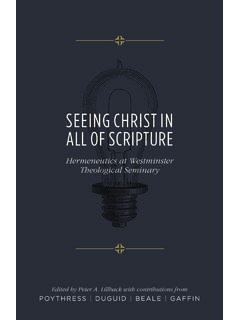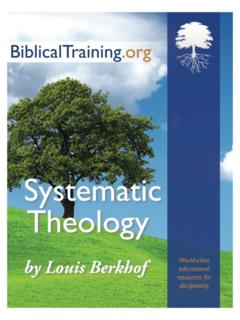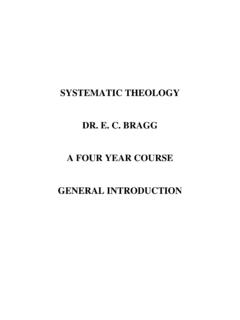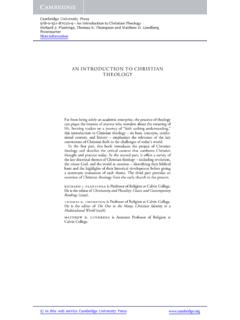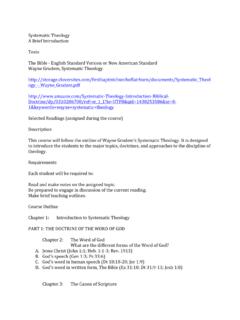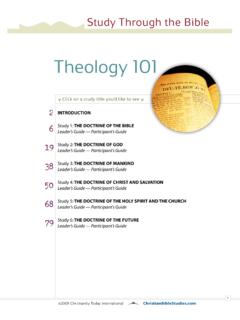Transcription of Lesson 1 INTRODUCTION TO SYSTEMATIC THEOLOGY THE …
1 Lesson 1 INTRODUCTION TO SYSTEMATIC THEOLOGY / THE DOCTRINE OF THE WORD PRAYER How many have taken a SYSTEMATIC THEOLOGY course before? How many have read a SYSTEMATIC THEOLOGY book? How many know what SYSTEMATIC THEOLOGY is? I. INTRODUCTION TO SYSTEMATIC THEOLOGY : THE 4 C S (INSTRUCT STUDENTS TO WRITE THESE DOWN) The task of SYSTEMATIC THEOLOGY is to be (1) comprehensive, that is, cover all of the standard teachings of the Scriptures, (2) coherent, as we show the order, the logic, and the clear, consistent message of the Bible over several topics, (3) contextual, that is, interpreting the sweep of doctrine in terms of current issues, and (4) conversational, engaging historical and contemporary points of view. A. What is SYSTEMATIC THEOLOGY ? (pg. 2) THEOLOGY is the study of God, and is derived from two Greek words, Theos, which means God, and logos, which means word or a conveying of information. So when we say SYSTEMATIC THEOLOGY , we mean the orderly arrangement of the study of God.
2 SYSTEMATIC THEOLOGY seeks to arrange the whole of Biblical teaching into logical, topical divisions. This, then, allows us to form doctrines and helps us to construct an overall view of the nature of God, as He has revealed Himself in Scripture, and the manner in which He interacts with His creation. So for example, if you look at your table of contents on your first page, you will see that our last Lesson will be on eschatology. We will be combing through all of scripture in order to collect and understand all of the relevant passages that consider the end times, such as Christ s return and God s final judgment. B. What SYSTEMATIC THEOLOGY is not: ( ) So now that we ve defined what SYSTEMATIC THEOLOGY is, we need to define what it is not. First of all, it is not Biblical THEOLOGY . At this point, you re probably thinking, Now wait a second, SYSTEMATIC THEOLOGY isn t biblical? Well, yes it is, and no it isn t.
3 Let me explain. SYSTEMATIC THEOLOGY is biblical in that it seeks to present what the Scriptures themselves teach. It is not considered biblical when it s contrasted with other categories of THEOLOGY . The term Biblical THEOLOGY refers to the study of God by tracing the historical development of doctrine through Scripture. Biblical THEOLOGY would also focus on understanding what the biblical authors and original hearers possessed about each doctrine. In other words, Biblical THEOLOGY would answer questions like, What does Isaiah teach about prayer? or What does the New Testament teach about prayer, and how has that teaching developed since the Old Testament? SYSTEMATIC THEOLOGY is different in that it would not focus on individual sections of Scripture or the historical development of prayer but on the whole of biblical teaching about prayer, and then it would seek to summarize that teaching as it pertains to today.
4 SYSTEMATIC THEOLOGY is also different from Historical THEOLOGY . Historical THEOLOGY is the study of Christian doctrine, as it has been considered by Christians in different periods of history. C. Advantages of Studying THEOLOGY Systematically & a Caution (pg. 2) (make notes on p. 58) So now that we have distinguished between the different studies of THEOLOGY , what are the advantages of studying THEOLOGY systematically? Well, there are several: 1) We are able to see what the whole of the Bible teaches on a given topic ( creation) 2) We are able to explore the logical relationships between the various Biblical doctrines ( We see how election, regeneration, conversion, justification, sanctification, and glorification are all part of God s redemption of man) 3) We are brought face to face with the fact that our knowledge is bounded by God s revelation, and are led to acknowledge the Bible as our source of knowledge about God 4) We see the harmony and consistency of the doctrines which teaches us about the unity of Scripture and proves to our hearts that Scripture has its origin in God 5) SYSTEMATIC THEOLOGY aims to change the way that we think about God and the way we think about ourselves.
5 It s a good discipline in bringing together Biblical exegesis, Biblical THEOLOGY , apologetics, and ethics. It produces creeds and statements of faith, and has great power to build up the church and encourage individual believers. We must admit, though, that there are potential dangers of studying THEOLOGY systematically. Please note that we do not think that a SYSTEMATIC THEOLOGY textbook, creeds, or statements of faith take the authoritative place of Scripture. Those things are extracted from and are subject to Scripture. That said, there are two pitfalls of studying THEOLOGY systematically that need to be mentioned and are somewhat related: 1) There is a danger of taking and understanding things out of context. It has been noted that a text without a context becomes a pretext for a prooftext. This can generate appeals to selective evidence that enable the interpreter to say what he or she wants to say, without really listening to what the Word of God says.
6 2) It s possible that the system in SYSTEMATIC THEOLOGY may distort Biblical truth. D. A. Carson has noted that even to choose topics, to hierarchialize them, is to impose a structure not transparently given in Scripture itself. So there is a danger that the choosing and ordering of topics can dictate the conclusions of those topics. For example, we could begin a study on the topic of the divine authorship of Scripture and conclude that the Bible is infallible. Likewise, we could begin a study on the topic of the human authorship of Scripture by looking at the people who physically wrote out Scripture and conclude that the Bible contains errors. In other words, our starting point could determine our conclusion. In order to guard against these dangers, we ll try to fill these classes with as much Scripture as possible. We want this class to be a faithful portrayal of what the Bible says. But it should be clear to you that you need to listen with discernment.
7 We must be like the Bereans spoken of in Acts 17:11 who received the message with great eagerness and examined the Scriptures every day to see if what Paul said was true. We must pray for discernment. Without the enlightenment of the Holy Spirit we ll never know God as we should. D. Why Study THEOLOGY ? 1. For God s Glory (blank) (pg. 2) Ultimately, we study THEOLOGY to glorify God. God is glorified when we seek to know Him (Philippians 1:9-11). The objective of studying THEOLOGY is to come to know God better and to increasingly learn how to please Him. 1 John 2:3 says that we know that we have come to know him if we obey his commands. There s a specific cognitive content to the Christian faith, and it s the responsibility of the local church to teach what the Apostle Paul calls sound doctrine. (2 Tim 4:3) 2. Corporately Reflect Christ to Others (blank) (pg. 2) As the body of Christ, we study THEOLOGY so that the church can be an accurate reflection of God to the world.
8 In a time when the very concept of truth is called into question, the church needs to be ready to give a reason for the hope that it has. 3. Individual Sanctification and Growth (blank) (pg. 3) Individually we must study THEOLOGY so that we may be sanctified and grow in knowledge and faith. We don t just want to know about God, as though he can only be known at a distance. No, we actually want to know God personally and to have a relationship with Him. The fear of the Lord is the beginning of knowledge (Prov. 1:7). When we learn to despair of ourselves and humbly seek to know the God of the Bible, it s then that the study of God begins to be impressed upon our hearts and minds, and it becomes real to us, as we find life and all blessings in Him alone. In many ways, evangelicals have abandoned deep doctrinal study for an emotional, subjective religion that places truth a distant second to how something feels.
9 As Christians, we believe in objective truth. We should be moved emotionally by our faith, but the source of that reaction should be the truth of who God is and what He has done, as it s addressed to the mind. Martyn Lloyd Jones said, What we have in the Bible is Truth; it is not an emotional stimulus, it is not something primarily concerned to give us a joyful experience. It is primarily Truth, and Truth is addressed to the mind, God s supreme gift to man; and it is as we apprehend and submit ourselves to the truth that the feelings follow. I must never ask myself in the first instance: What do I feel about this? The first question is, Do I believe it? Do I accept it? We must seek to understand God s truth revealed to us in Scripture if we re to ever understand God and ourselves, as we should. It s intellectual suicide to believe that absolute truth exists but not search for it in the Scriptures that claim this truth.
10 To do otherwise is nothing more than spiritual folly. 4. Doctrine Matters (blank) (pg. 3) Finally, we should study THEOLOGY because doctrine matters. The cognitive content of the Christian faith is of vital importance. In John 8:31, Jesus said, If you hold to my teaching, you are really my disciples. Biblical doctrine defines the boundaries of who God has revealed Himself to be. We can t just make up what we think God is like or imagine that He will approve this or that. If we did, too often He would look just like us. Perhaps this is why Paul warns Timothy that, the time will come when men will not put up with sound doctrine. Instead, to suit their own desires, they will gather around to say what their itching ears want to hear (2 Tim. 4:3-4). A trend observable in many evangelical churches is to avoid doctrines that may be difficult to understand or which may be sources of controversy. So there is never any teaching on election, predestination, or God s wrath.
